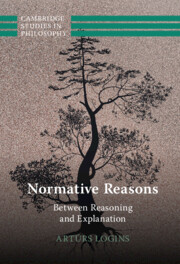My interest in normative reasons grew naturally out of my PhD thesis work on evidence. It is a popular view in epistemology that evidence is best understood in terms of reasons to believe. Thinking about reasons to believe naturally led me to the topic of normative reasons in general. But, while focusing on reasons in general, I quickly realised that it is a complex issue, with many parallel debates and multiple, sometimes overlapping distinctions. In a sense it also felt like reasons are one of those things where, as Saint Augustine notes about time, you know what they are when no one questions you about them but find it difficult to explain when someone asks you what they really are. One thing that I was desperately looking for but had a hard time finding during the initial stages of my interest in reasons was a bird’s-eye view of the topic, an overview of all the major theories of reasons, the most important distinctions, arguments, and key implications of thinking about normative reasons. Of course, there are already a number of formidable texts on normative reasons that could serve as an introduction to the topic, but I couldn’t find one comprehensive treatment of the subject. Realising that I might not be alone in longing for such an overview, I eventually concluded that I had to create it myself. This in-depth overview of the debates now occupies an important part of the present monograph. Somewhat unsurprisingly, once I had a better understanding of the contours of contemporary discussions, I arrived naturally at my own positive view of what normative reasons are. The core idea of the positive view defended in this monograph then landed almost effortlessly in a dot-connecting moment once I arrived at my own bird’s-eye view of reasons.
Section 1.3 of Chapter 1 has previously appeared as a journal article (Artūrs Logins, ‘Subjective Unpossessed Reasons’, Thought: A Journal of Philosophy, 7:262–270, 2018). It has only minor modifications here. (Also, I have retained the original acknowledgements, in which I thank the reviewers for the journal that originally published the article.)
The main argument in Section 2.6 of Chapter 2 has also previously been published as a journal article (Artūrs Logins, ‘Normative Reasons without (Good) Reasoning’, Ethics, 130[2]:208–210, 2020). Again, it has only minor revisions, a new passage where a possible new worry for the argument is considered, and some modifications in order to suit the present format and avoid unnecessary repetition. Apart from the changes to the introductory sentences of the article, the text reproduced here is almost the same as the previously published version.
I have to thank many people for discussions, long and short, during my work on this monograph. I would like to thank Pascal Engel, Sebastian Schmidt, and Aleks Knoks for written comments on (parts of) the manuscript. Many thanks also to people with whom I had the chance to discuss ideas from the book, including Davide Fassio, John Hawthorne, Anne Meylan, Jacques Vollet, Jörg Löschke, Daniel Whiting, Ralph Wedgwood, Mark Schroeder, Steve Finlay, Atay Kozlovski, Benoit Gaultier, Edgar Phillips, Fabrice Teroni, Julien Deonna, Michele Ombrato, and surely others. I would like to thank audiences at the University of Geneva, the University of Zurich, Collège de France (Groupe de Recherche en Épistémologie), and the 2019 Joint Session of the Aristotelian Society in Durham. Special thanks to the editors of the series, in particular to Sandy Goldberg for all his support and patience throughout this project. Thanks also to Hilary Gaskin from Cambridge University Press and to two extremely constructive and helpful anonymous readers! Thanks also to Kathleen McCully for her invaluable help with proofreading the manuscript. I would like to express my gratitude also to my good friend and artist Hadrien Peltier, who conceived and realised the image of the mysterious tree with unknown roots and with leaves of different shapes specifically for the cover of the present book. Most of all, thanks to my family for their continuous support and belief. I am grateful to my wife Alla, my daughters Anastasia and Agate, my mother Ināra, and my sister Agnese. I received the offer of the contract from Cambridge University Press two weeks or so after my father passed away unexpectedly. I never told him about my manuscript, hoping to surprise him with good news. This book is dedicated to his memory.
The manuscript was completed with generous support from the Swiss National Science Foundation (grant nos. 171464, 171466, and 186137). The open-access publication of this book has been published with the support of the Swiss National Science Foundation (grant no. 10BP12_206406).

